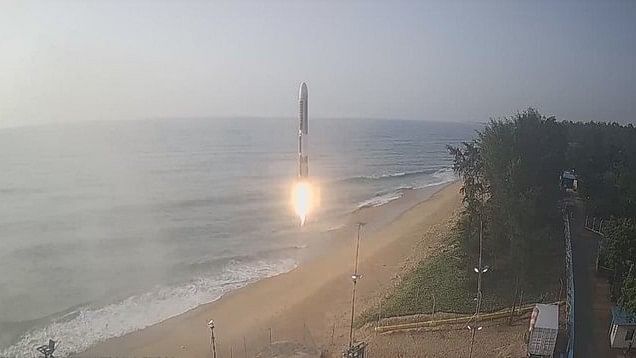
The launch of Agnibaan SOrTeD (Suborbital Technological Demonstrator) by space tech start-up Agnikul Cosmos.
Credit: X/@AgnikulCosmos
Chennai: After four failed attempts, space tech start-up Agnikul Cosmos on Thursday successfully launched its first rocket Agnibaan SOrTeD (Suborbital Technological Demonstrator) from its own launchpad within the Satish Dhawan Space Centre (SDSC) in Sriharikota, near the city.
Agnibaan SOrTeD is the country’s second privately-built rocket by the Chennai-based start-up which is incubated by the prestigious Indian Institute of Technology, Madras (IIT-M).
The successful launch on Thursday had many firsts to its credits. Agnibaan SOrTeD is the first rocket to be launched from a private launch pad, it is the country’s first semi-cryogenic engine flight and the world’s first single piece 3D printed engine designed and built indigenously.
The 3D-printed manufacturing process is expected to lower the launch cost and cut down the time taken to assemble the vehicle with the start-up looking at flying an orbital mission towards the end of the 2025 fiscal and plans to launch regular flights from the 2025 calendar year. Thursday’s launch will also encourage many private players to enter the space arena.
The flagship launch vehicle, "Agnibaan", is designed to be compatible with the mobile launchpad called "Dhanush", allowing for launch flexibility regardless of location. Agnibaan can be configured to accommodate payloads ranging from 30 kg to 300 kg, ensuring versatility across a wide range of mission requirements.
"All the mission objectives of this controlled vertical ascent flight were met and performance was nominal", the start-up said in a statement. The 18-metre tall rocket is designed for small satellites and can launch payloads of up to 300 kg into 700 km low earth orbit.
The launch will help the start-up gather flight data and ensure optimal functioning of systems for the two-stage orbital launch vehicle, Agnibaan. Thursday’s launch was a boost to Agnikul Cosmos which had to cancel the launch four times in the past due to last-minute technical glitch.
ISRO congratulated Agnikul Cosmos for the successful launch of the Agnibaan SoRTed-01 mission from their launch pad. "A major milestone, as the first-ever controlled flight of a semi-cryogenic liquid engine realized through additive manufacturing", ISRO wrote on its X account.
ISRO chairman Dr S Somanath said the launch motivates ISRO to support the space startups and non-governmental entities for innovation and Atmanirbharata to create a vibrant space ecosystem in the country.
The Indian Space Association (ISpA) said what Agnikul has achieved today is nothing short of a historical milestone, since India launched its maiden rocket in 1963 from Thumba launch station.
"This is a huge boost and a proud moment for India’s thriving private space industry and just a glimpse into what the future holds for us, our hearty congratulations to the entire team behind this and best wishes for their future efforts", Lt. Gen. A.K. Bhatt (Retd.), Director General, Indian Space Association, said in a statement.
This significant launch, coupled with the recently introduced guidelines for the implementation of the Indian Space Policy 2023 by IN-SPACe and the new FDI regulations, will undoubtedly bolster global confidence in India's private space industry and its growing capabilities, he added.
The Chennai-based start-up was founded in 2017 by Srinath Ravichandran, Moin SPM, and Satya Chakravarthy, and became the first company in India to sign an agreement with ISRO under the IN-SPACe initiative.